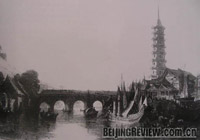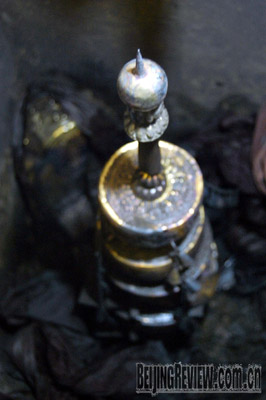|

|
|
WORLD WONDER: A painting of the Dabaoen Temple
|
An ancient reliquary that has lain under the earth for over 1,000 years was unearthed in Nanjing, capital of east China's Jiangsu Province, on August 7. The relic, used as a shrine, was found in an iron box discovered in an underground palace located in the ruins of the Dabaoen Temple in the city.
The underground palace of the Dabaoen Temple was opened on July 17. According to the contents inscribed on a stele found there, this palace was built in 1011 and belonged to a temple, named Changgan Temple, in the Northern Song Dynasty (960-1127).
Over the ages the temple had been rebuilt many times and was given different names, including the Dabaoen Temple, in the later dynasties. Work on the Dabaoen Temple began in 1412, under the order of the Emperor Yongle (1360-1424) who hoped to build a temple to commemorate his mother.
It took more than 100,000 workers 19 years to complete. The temple's nine-layered tower was described as one of the seven world wonders in the middle ages, along with the amphitheater in Rome and the leaning tower of Pisa. Having existed for over 440 years, the Dabaoen Temple was destroyed by wars in 1856.
But, fortunately, the underground palace beneath the temple escaped all the misfortunes and remains intact.
 |
|
TREASURE SHINES: The tip of the pagoda appears after archaeologists open the silk cloth that wraps it
|
The discovery of the religious relic on August 7 proved the previous guess of archaeologists correct, as it was recorded in the stele found in the underground palace that the relic and other treasures were preserved there. It is the first reliquary unearthed in China that was clearly mentioned in a stele buried together with it.
Wrapped in a big silk cloth, the relic found in Nanjing was believed to be one of the more than 80,000 pagoda-shaped shrines made during the reign of King Ayu of India (273 B.C.-236 B.C.), in which the remains of Sakyamuni, or the historical Buddha, called shelizi in Chinese, were enshrined.
In Buddhism, shelizi, formed from the ashes of cremated Buddhist masters, are highly sacred objects. King Ayu's reliquaries were first built in ancient India, when King Ayu separated the remains of the body of the Buddha into 84,000 parts and built 84,000 of these relics to distribute across the world. China is home to 19 of them.
It is a miracle that the reliquary found in Nanjing is so well preserved after 1,000 years and even more amazing that the silk cloth wrap has not been eroded.
Qi Haining, head of the archaeological team, said that some parts of the big cloth were weaved and sewn with gold thread, which was a difficult skill in gold textile making in ancient China.
The pagoda has not yet completely been taken out of the iron box, but scientists estimated it to be 1.1 meters high, and made up of four to five layers.
According to Hua Jianrong, Curator of the Nanjing Municipal Museum, in a report by China News Service, the silver-made pagoda was plated with gold and decorated with agates and other gemstones. Exquisite designs were carved on the body, including sitting reliefs of the Buddha.